Jasmin Wilson lost herself to meth – now she’s determined to help others escape the ice trap
Jasmin Wilson beat her meth addiction but it still shadows her life. With searing honesty, she shares her journey in the hope of changing the way we view ice addicts.
SA Weekend
Don't miss out on the headlines from SA Weekend. Followed categories will be added to My News.
It’s impossible to notice, but Jasmin Wilson is nervous as she talks about her drug use.
She speaks eloquently and articulately about the two years she spent using meth, how her addiction spiralled out of control and eventually cost her two homes, a couple of cars and her marriage.
She talks about the night five years ago when, after another all-night bender, a caring police officer suggested it was time she took back control of her life.
She talks about ringing Adelaide’s only dedicated detox centre every day for more than three weeks before they could find her a bed.
She talks about her rehabilitation journey of divorce and alcoholism, and of returning to that same detox unit three years later, this time to curb an addiction to the bottle.
And she talks about the effect her drug use and addiction has had on her loved ones, especially her children, and of the massive societal problems people like her face as they attempt to turn around their lives.
She speaks frankly. Passionately. Intelligently. Honestly.
She speaks with an expertise on the topic which goes far beyond her personal circumstance.
Because drug use has done more than just reshaped Jasmin’s own life. Many others within her circle of family and friends have also struggled with meth addiction.
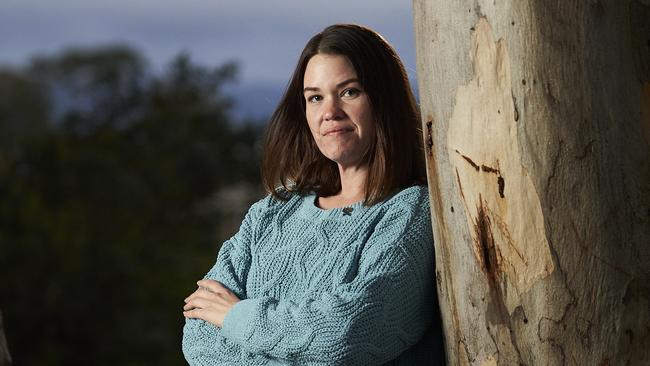
The way society deals with addiction and drug use is also front and centre of Jasmin’s working life.
The 36-year-old mother of two works in health promotion and mental health first aid with the Aboriginal Drug and Alcohol Council, is studying to become a counsellor and wants to eventually work in drug and alcohol rehabilitation.
When it comes to addiction and methamphetamine use, she’s what those fluent in corporate jargon might recognise as a “subject matter expert”.
She’s talking to me from the opposite side of a large, communal table in the ADAC offices in suburban Adelaide and we’re joined by her father, and ADAC director, Scott Wilson, and long-time workers Byron Wright and Jimmy Perry.
I had called Scott Wilson out of the blue a few weeks earlier to get his input regarding the impact meth use was having on the community, especially in the regions.
Scott had warned about the lack of detox and rehabilitation beds in South Australia, and mentioned he knew a woman who had been motivated enough to ring the Drug and Alcohol Services (SA) detox centre at Glenside every day for weeks until she secured a bed, to rid herself of her meth addiction.
He mentioned her to highlight how hard it was to get help, because not many addicts were motivated, disciplined or self-aware enough to make a daily phone call to a detox centre. In fact, many who use meth are lucky to even have a working phone.
Scott didn’t tell me the woman he was talking about worked at ADAC. And he didn’t tell me she was his daughter.
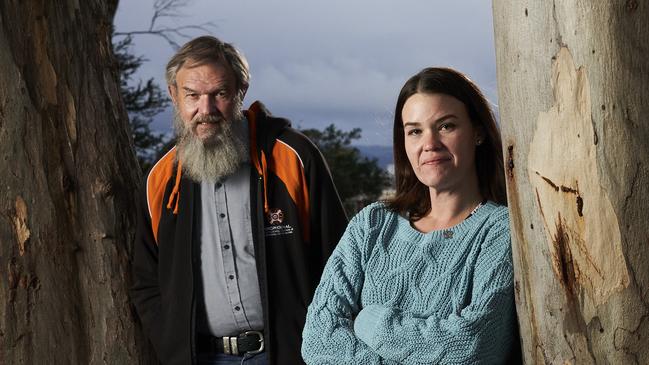
‘SUSPICIOUS, PARANOID, ANXIOUS’
When I asked if she would be prepared to speak, he arranged for her to join him, Wright and Perry for a wide-ranging conversation about the issues they deal with every day, for clients from all corners of the state but primarily for those in regional and remote areas.
Jasmin is one of the dominant voices of the conversation and there’s no hint of the nerves she later admits to, or the old wounds that speaking so frankly can reopen. But she gets in touch a couple of days later and comes clean about the stress our conversation caused.
“I lost two houses, a couple of cars, a couple of years in active use and even more years in recovery,” she says.
“I lost myself and my marriage all because of meth and I only used for two years.
“I must live with knowing it majorly affected my children, with the constant fighting and unstable, absent parenting. I see the ill-effects manifest in my children in different ways on a daily basis.
“I am also very suspicious, paranoid, keep to myself and still get anxiety and the odd panic attack when I’m in a situation that reminds me of a time when I was using.”
Despite this, Jasmin wants to tell her story.
She wants to help remove the stigma associated with meth use and to spread the message to political leaders and wider society that meth addiction should be treated as a health issue, rather than a criminal one.
But she’s stressed about speaking out.
She knows there’s a high percentage of people who relapse after going public and is concerned about the possible impact it might have on her children, now aged 10 and 16.
She’s also sick of being judged.
Even now, five years since she stopped using, she knows people cast judgments about her history with the drug.
People look at you differently, she says, when they discover you have been a meth user. Their energy changes and they pigeonhole you as likely to have a negative, angry and aggressive personality.
“I feel the same judgments now as I did while I was using,” she says. “It’s possibly all in my head but it (meth use) isn’t something you casually mention over coffee, and once you do (tell them), people make their own private assumptions. It hurts, but it comes with the territory.
“But I know we need to start having uncomfortable, open conversations for things to change.
“If I can’t stand up now when I am so far removed from the situation, how can I expect someone in the grips of addiction to speak up?
“Part of me wanted to recover to eventually tell some of my story, as I knew no one would have believed me as someone who uses meth.”
And so, she’s decided to speak out. To let down her guard and tell her story.
Legalities prevent us from disclosing how she started using methamphetamines, but the first time she tried she was hooked – and didn’t sleep for five days.
‘I FELT ZERO RESPECT AND CONCERN’
Like many users, initially she was able to keep her addiction hidden from her workmates and close family, but behind the veil of secrecy, her life was unravelling.
Police, called in by neighbours alarmed at the all-night fighting and the screaming emanating from behind the closed curtains, became regular visitors to her home.
Her mea culpa came after an all-night session at the pokies, and that aforementioned pre-dawn chat with a police officer who made her realise that nearly all of her problems were created by and associated with her drug use.
After that conversation she spent a few hours alone in her car, contemplating the direction of her life and came to the conclusion she needed help. So she called the detox centre at Glenside.
There were no spots available. She tried again the next day. And the next. And the next. She called them every day for 3½ weeks until she was finally admitted.
In the meantime, she came clean to her work colleagues, including her father, who offered their support and, importantly, left her job open while she recovered.
It was an acceptance that she rarely felt from the wider community.
From the first time she used meth, she says, people had a tendency to assume she fit into the often inaccurate stereotypical portrait of a user that we’ve all seen on TV ads. You know the ones, where addicts are picking the skin off their faces and arms, or attacking hospital staff while in a psychotic rage.
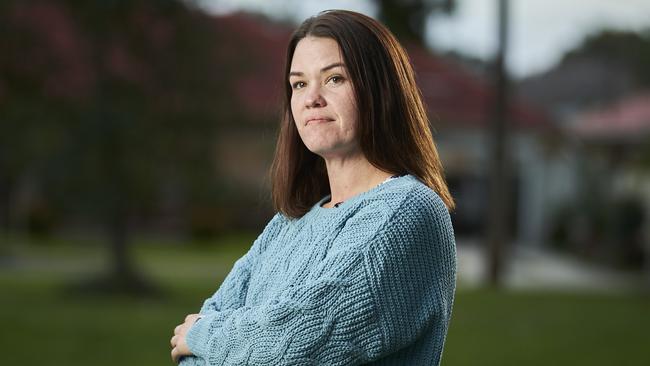
“From the get-go, I was tarnished with a brush, painted with everything a meth user had previously done wrong,” Jasmin says.
“The fact that I could have any cruel injustice done to me because I was a meth user wouldn’t have mattered.
“I felt almost zero respect, concern or consideration. As if making one choice meant I had chosen to have any and every possible negative experience of life. I had also forgone the right to even complain about the ill-treatment to anyone without being told it was my fault, ‘it’s because you’re a meth user’.
“I genuinely felt like I could have been murdered and it wouldn’t have made the headlines. On the contrary, it would barely be worth lodging the police report, and just be put down to a drug overdose.
“Ironically, the only people to treat me with any respect or concern outside of my immediate family were the police. They genuinely tried to convince me that my drug use wasn’t helping my issues at almost every one of my 30-plus minor interactions with them.”
Jasmin wants people to understand that many people who struggle with meth addiction can remain outwardly functional for months, or even years after they start using, and is keen to reduce the hysteria around the drug.
It’s this hysteria, she says, which forces users to hide their habit and makes it harder for them to put their hand up and ask for help.
She set her life on a new path after her stint in detox but the stress of reintegrating to society, a marriage breakdown and what she describes as “maladaptive coping mechanisms” led her down another addictive path, this time towards alcoholism.
Three years later she found herself back on the phone to that same Glenside detox centre. This time she called every day for five weeks before she could get in, but now, two years down the track, she remains proudly sober.
‘I’D NEVER BEEN SO HARSHLY JUDGED’
Jasmin says the contrast in reactions when people learned of her two addictions was stark.
When she was using meth, she felt like a criminal. When she was drinking more than 150 standard drinks a week, she felt borderline normal.
“I think that’s why I turned to alcohol, because it was socially accepted,” she says.
“It was celebrated. It was like I went from being a leper to being allowed to drink at 10 in the morning and no one cared.
“They’d be like ‘Oh, you’re dealing with a divorce, you’re fine – have another one’. No one cared. But when I was using meth, I’d rather go around telling people that I was a murderer than admit to using meth.”
And so she wants to get the message across that people who use meth are like anyone else. They are complex, multi-faced people struggling with an addiction. They have hopes, dreams, desires, fears and disappointments. They are mothers, fathers, daughters, sons, brothers, sisters, partners and friends.
“And yet because of all the negative connotations, they are minimised to a single habit,” she says. “The fact that you use a particular drug erases your individuality and instantly makes you fair game for society to dump on. It’s a lonely and isolating experience.
“Not only does it feel like you are an outsider in your own community, but there is also subsequently a lot of lateral violence among users. I had never experienced being so harshly judged until I decided to use methamphetamine.
“The week I started using I was both a ‘newbie’ and a ‘lifer’ in the same sentence. One thing about me cancelled out everything else. I found it quite devastating.”
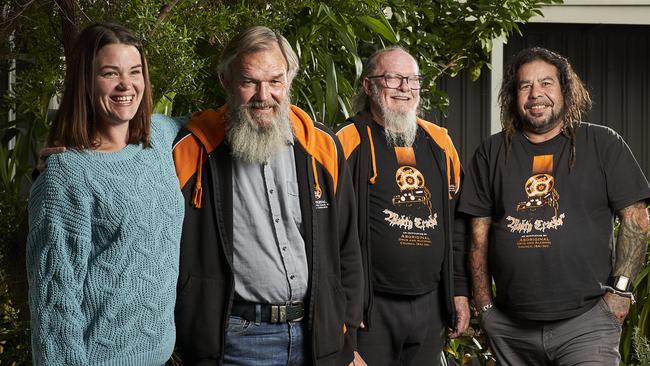
Jasmin understands the negative views about meth. She has lived through the hell and madness the drug can unleash on a person, a family and a community. She knows first-hand the pain it can cause.
But she believes society needs to change its approach. She says there’s a lack of political will and, critically, funding thrown at the issue.
“The fact we only have 20 residential rehab beds to service the entire Adelaide region is shocking – particularly when you think some people could stay the whole 12-month program, which means that could be just 20 people a year. And that’s for all drug problems, not just meth,” she says.
“There needs to be a whole range of different treatment options for it to be suitable to the complex needs of a recovering drug user – instead of leaving it to just the families and the justice system, which are both struggling with the gravity of the situation.
“They’re trying, but they don’t have the skill-set, resources or best treatment outcomes. It’s destroyed marriages, people and is creating new, compounding generational traumas.”
‘WE WILL PULL EACH OTHER DOWN’
Jasmin says users sent to jail because of a drug-related crime are more likely to become repeat offenders than had they been offered a non-judicial way out of their current situation – just like she had.
“There is a lot of lateral violence among users, as if everything society has dumped on or accused a fellow meth-user of gets thrown your way during a discussion,” she says.
“Like crabs stuck in a bucket, we will seemingly pull each other down, accidentally snapping a claw off, just to try and get ourselves out of the bucket.”
Meanwhile, Aboriginal Drug and Alcohol Council director Scott Wilson says his organisation desperately needs a cash injection to continue its three-decade history of helping people struggling with addiction.
Wilson says the council faces a constant battle to provide the frontline services which have helped thousands of both Indigenous and non-Indigenous people for nearly 30 years.
ADAC’s plight is highlighted today as SAWeekend, The Advertiser and Sunday Mail launch a campaign, Breaking The Ice, to throw a spotlight on methamphetamine use and the problems the drug, also known as ice, can cause in society.
The campaign will shine a spotlight on people affected by ice, ranging from those who have used the drug, their families and communities through to the organisations trying to help.
It will also focus on gaps in the system and what needs to happen next, from addressing a dearth of detox and rehabilitation beds, to improving education in schools, to examining the need for more mental health facilities and an increase in drug counsellors.
The campaign also aims to reduce the stigma surrounding people addicted to meth and treat the problem as a health issue rather than a criminal one.
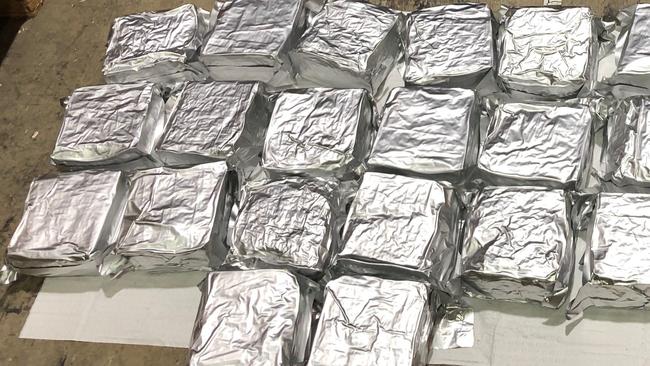
The Aboriginal Drug and Alcohol Council runs a 12-bed rehabilitation clinic in Port Augusta called Footsteps, drug and alcohol day centres in Port Augusta and Ceduna, and a mobile team of veteran counsellors, including Jimmy Perry and Byron Wright. The counsellors travel to remote and regional communities to educate about drug use.
The organisation also runs drug and alcohol support in the state’s jail system and helps inmates returned to their communities after they are released from prison.
But Wilson, a former drug user and alcoholic who spent time in jail when he was young, says it is becoming increasingly hard for ADAC, which employed more than 70 people last financial year, to make ends meet.
The council is primarily funded by the federal government but in 2018, then Aboriginal affairs minister, Coalition MP Nigel Scullion, slashed ADAC funding as part of a move to fund fewer peak bodies and more frontline services.
“We’re sitting here thinking, mate, we run a rehab, two day centres, a mental healther, a job program, a needle syringe program – peak bodies don’t normally do that,” Wilson says.
He has written to new federal Indigenous Affairs Minister, Labor’s Linda Burney, to plead for more money for ADAC, which is operating its Footsteps rehab clinic with the same amount of annual funding it received in 2014.
Hence as pay rates have risen, Footsteps has operated with increasingly fewer staff.
“Eventually we’re going to have to sit down and think ‘well, hang on, can we actually get away with only having X amount of staff’,” he says. “And we can’t, because that also becomes a safety issue.”
He has also written to ministers in the new Labor state government, and has urged them to reinstate funding for the council’s drug diversion programs, which offer users a non-judicial path to overcome their addiction.
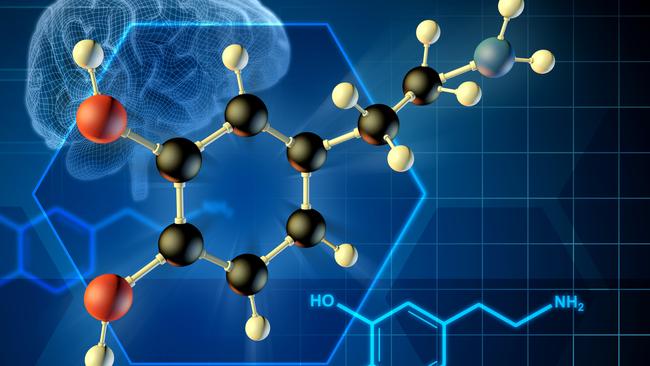
Talking about the actual effects of the drug, Jasmin Wilson says the rush of dopamine produced by the consumption of methamphetamine is enough to disconnect a user from reality.
Dopamine is a neurotransmitter and hormone made naturally by the human body that sends messages between nerve cells to make people feel good.
“You’re given dopamine levels that you can’t naturally create,” she says. “My brain literally thinks I have finished my assignments, I’ve cleaned the house, I’m president of the world who has done all these amazing things.
“You have that much dopamine in your system that you believe you are really killing it at life and yet, you’re not. You’re in a really shit place in life.
“Your mind thinks that everything is all good. That’s why you can sit there literally surrounded by filth and be happy as Larry thinking that, rather than having this desire to clean up my mess, your brain thinks you have already done it.
“That’s why you can get a reaction when people try to bring you back to earth. There’s this kind of, ‘What? Huh? What are you talking about?’ And you can see the confusion in people’s faces when you might disagree with their train of thought



